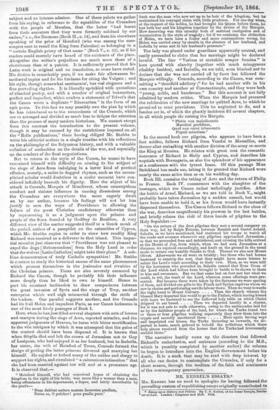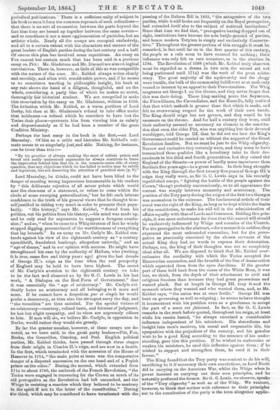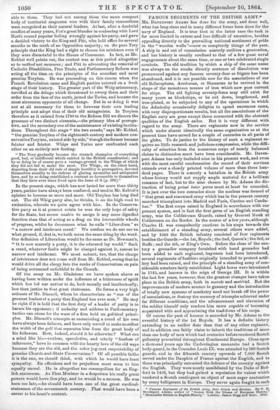KEBBEL'S ESSAYS.*
Mn. Kamm has no need to apologize for having followed the prevailing custom of republishing essays originally contributed. to • Essays upon History and Polities. By T. It Hebbel, of the Inner Temple, Harris- tevat-Law. London : Chapman and Hall. 1804.
periodical publications. "rhere is a sufficient unity of subject in his book to save it from the common reproach of such collections— that there is uo sort of connection between the parts beyond the fact that they are bound up together between the same covers— and to constitute it not a mere agglomeration of particles, but an artistic whole. Nearly all the essays are occupied exclusively, and all to a certain extent with the characters and careers of the great leaders of English parties during the last century and a half. Of course this plan has involved some repetitions. An essay on Fox cannot but contain much that has been said in a previous essay on Pitt : Mr. Gladstone and Mr. Disraeli are almost logical correlatives. There is, however, as little of this as was compatible with the nature of the case. Mr. Kebbel always writes clearly and sensibly, and often with considerable power, and if he seems to us sometimes wanting in philosophic insight, his book at any rate shows the hand of a diligent, thoughtful, and on the whole, considering a party bias of which he makes no secret, thoroughly fair historical student. We are compelled to make this reservation by the essay on Mr. Gladstone, written in 1859. The irritation which Mr. Kebbel, as a warm partizan of Lord Derby, felt then at Mr. Gladstone's refusal to take office under that nobleman—a refusal which he considers to have lost the Tories their places—prevents him from viewing him as calmly and dispassionately as if he had been a member of the great Coalition Ministry.
Perhaps the best essay in the book is the first,—on Lord Macaulay. Of him as a critic and historian Mr. Kebbel'e esti- mate seems to us singularly just-and able. Nothing, for instance, can-be truer than this :—
" By his practice of always making the most of salient points and broad and easily understood arguments he always contrives to leave the impression behind him that his is the common-sense side of every question, that any objections which he has failed to notice may be subtle and ingenious, but not deserving the attention of practical men (p, 9)."
Lord Macaulay, he thinks, could not have been blind to the danger of creating wrong impressions innumerable iu his readers by " this deliberate rejection of all minor points which would mar the clearness of a statement, or refuse to come within the circle of some sweeping generalization," but he felt such intense confidence in the truth of his general views that he thought hi m- selfjustified in risking very much in order to promote their popu- larity. "His history," says Mr. Kebbel, "flowed from his politics, not his politics from his history,—his mind was made up, and he only read for arguments to support a foregone conclu- sion ;" and so, " when he carne to a Whig stratum of fact he wisely stopped digging, preconvinced of the worthlessness of everything that lay beneath." In an essay on Mr. Carlyle Mr. Kebbel con- tends against his view of the eighteenth century as "a century spendthrift, fraudulent bankrupt, altogether unlovely," and an " age of shams," and in our opinion with success. He might have strengthened his case by the authority of Hallam, who (writing, it is true, some five and thirty years ago) gives the last decade of George II.'s reign as the time when the real prosperity of England may be held to have been highest. The secret of Mr. Carlyle's aversion to the eighteenth century we take to be the fact well observed on by Sir G. C. Lewis in his last work, " A Dialogue on the Best Form of Government," that it was essentially the " age of aristocracy." Mr. Carlyle evi- dently hates an aristocracy and all belonging to it more and more. If he cannot have a despotism par et simple he would prefer a democracy, as then also the strongest carry the day, and " the veracities" are thus satisfied. For the special virtues of an aristocracy—courtesy, refined taste, and fairness of judgment, Le has but slight sympathy, and its vices are supremely odious to him. If men will sin, we believe Mr. Carlyle, in opposition to Burke, would rather they would sin grossly.
By far the greater number, however, of these essays are de- voted, as we have said, to the great party leaders—Pitt, Fox, Burke, the Grenvilles, Canning, and Peel. English political parties, Mr. Kebbel thinks, have passed through three stages from their origin in Charles IL's reign, and are now in a fourth. In the first, which terminated with the accession of the House of Hanover in 1714, "the main point at issue was the comparative danger of a disputed succession on the one hand and of a Popish prince on the other." During the second, which extended from 1714 to about 1790, the outbreak of the French Revolution, "the Tories were engaged in recovering for the Crown as much of its old prerogative as the Revolution had left untouched, and the Whigs in resisting a reaction which they believed to be contrary to the spirit if not to the letter of the constitution." During the third, which may be considered to have terminated with the
passing of the Reform Bill in 1832, " the antagonism of the two parties, while it still broke out frequently on the Royal prerogative, had extended itself also to the subject of national institutions." Since that time we find that, "prerogative having dropped out of sight, institutions have become the sole battle-ground of parties, and hence modern Toryism is simply and exclusively Conserva- tive." Throughout the greater portion of this struggle it must be remarked, in fact until far on in the first quarter of this century, the people as a rule seem to have counted for nothing ; their influence was only felt on rare occasions, as in the election in 1784. The Revolution of 1688 (which Mr. Kebbel truly observes must be regarded as a drama in two acts, the second act not being performed until 1714) was the work of the great aristo- cracy. The great majority of the squirearchy and the clergy were hostile, the bulk of the community indifferent or at most only roused to interest by an appeal to their Protestantism. The Whig magnates set George I. on the throne, and they never forgot that this was their doing. Those' king-making peers the Seywours, the Fitzwilliams, the Cavendishes, and the Russells, fully realized that that which maketh is greater than that which is wade, and felt no overweening respect for the work of their own hands. The King should reign but not govern, and they would be his assessors on the throne. And for half a century they were, until their authority seemed so necessary an element in the constitu- tiou.that even the elder Pitt, who was anything but their devoted worshipper, told George III. that he did not see how the King's Government could be carried on without the support of the Great Revolution families. But we must be just to the Whig oligarchy. Narrow and exclusive they certainly were, and they seem to have transmitted these qualities like a hereditary taint to their des- cendants in the, third and fourth generations, but'they raised the England of the -gtuarts—a power of hardly more importance than Sardinia five yeare ago—to a great nation. In their long struggle with the King through the first twenty-five yearsof George M.'s reign they really were, as Sir G. C. Lewis says iu his recently republished essays, " fighting the battle of the people against the Crown," though probably unconsciously, as to all appearance the contest was simply between monarchy and aristocracy. The position of the Tory party during the reigns of the first two Georges was anomalous in the extreme. The fundamental article of their creed was the right of the King, as long as lie kept within the limita of the constitution, to make his will tell in the administration of affairs equally with that of Lords and Commons. Holding this prin- ciple, it was most unfortunate for them that this sacred will should be exclusively influenced by Whigs and enemies of the Church. For the prerogative in the abstract, —for a monarch in nubibus, they expressed the most unbounded veneration, but for the prero- gative as practically exercised by the chosen servants of the actual King they had_no words to express their detestation. Perhaps, too, the king of their thoughts was not so completely ideal after all. We are disposed to think that Mr. Kebbel over- estimates the cordiality with which the Tories accepted the Hanoverian succession, and the breadth of the line of demarcation which separated them from the open Jacobites. If the greater part of them held back from time cause of the White Rose, it was less, we think, from the depth of their attachment to civil and religious freedom than because they had great possessions and wanted pluck. But at length in George III, they found the monarch whom they wanted and who wanted them, and, as Mr. Kebbel says, "the union was at once fertile." George III. was bent on governing as well as reigning ; he seems to have thought it inconsistent with his position even as a gentleman to accept the part of a mere roi faineant. In fact, as Sir G. C. Lewis remarks in the work before quoted, throughout his reign, at least while his reason lasted, " he always exercised a considerable influence independent of his ministers. His shrewdness and insight into men's motives, his moral and respectable life, his sympathies with the prejudices of the country, and his genuine wish to be a good King according to the measure of his under- standing, gave him this position. If he wished to undermine or weaken. his ministers, he used this influence against them ; if he wished to support and strengthen them, he used it in their favour."
The King found that the Tory party was content to do his will, sacrificing to it if necessary their own convictions, as Lord North did in carrying on the American War, whilst the Whigs when in power insisted on carrying out their own principles, and he naturally preferred the former. Sir G. C. Lewis, we observe, speaks of the "Tory oligarchy " as well as of the Whig. We venture; however, to think that neither with reference to their principles nor to the constitution of the party is the term altogether applic-
able to them. They had not among them the same compact body of territorial magnates who with their family connections were recognized as their natural leaders. Atlast, after a doubtful conflict of many years, Fox's great blunder in coalescing with Lord North roused popular feeling strongly against his party, and gave a decided victory to the King and Pitt, who held office for several months in the teeth of an Opposition majority, on the pure Tory principle that the King had a right to choose his ministers even if they were distasteful to the House of Commons. In fact, as Mr. Kebbel well points out, the contest was at this period altogether
as to method not measures ; and Pitt in advocating the removal of Catholic Disabilities, Free Trade, and Parliamentary Reform was
acting all the time on the principles of the soundest and most genuine Toryism. He was proceeding on this course when the French Revolution came and English parties entered on a fresh stage of their history. The greater part of the Whig aristocracy, terrified at the deluge which threatened to sweep them and their order from the face of the earth, joined the Tories, and became the most strenuous opponents of all change. But in so doing it was not at all necessary for them to forswear their own leading principle and adopt that of their old antagonists. In Toryism therefore as it existed from 1790 to the Reform Bill we discern the presence of two distinct elements,—the primary idea of preroga- tive, and the secondary one of the maintenance of existing institu- tions. Throughout this stage " the two creeds," says Mr. Kebbel, "the genuine Toryism of the eighteenth century and modem con- servative Toryism, existed side by side," though the former became fainter and fainter. Whigs and Tories now confronted each other on an entirely new footing.
" The Tory gradually became the staunch champion of everything good, bad, or indifferent which existed in the British constitution; and by so doing he of course gave a vantage-ground to the Whigs of which they did not fail to make the most. The Whigs, on the other hand, departing from their old rule of simple hostility to prerogative, devoted themselves steadily to the redress of glaring anomalies and antiquated laws, and by so doing established a contrast so favourable to themselves that they have ever since lived upon the fame of it (p. 396)."
In the present stage, which has now lasted for more than thirty
years, parties have always been confused, and tend in Mr. Kebbel's opinion to become so more and more. Old Toryism has long died out. The old Whig party also, he thinks, is on the high road to
extinction, wherein we quite agree with him. In the Conserva- tive party as it at present exists he sees the only hope of safety for the State, but seems unable to assign it any more dignified function than that of acting as a drag on the irreversible wheels of progress, whilst he denounces what he calls " Liberalism " as " a narrow and intolerant creed." We confess we do not see-on what ground, if, that is, we both mean the same thing by the word. Our definition of Liberalism would be the same as Dr. Newman's, " It is now scarcely a party, it is the educated lay world." Such a creed, whatever faults might be charged against it, cannot be narrow and intolerant. We must submit, too, that the charge of intolerance does not come well from Mr. Kebbel, seeing that he would drive all the clergy into the ranks of Conservatism on pain of being accounted unfaithful to the Church.
Of the essay on Mr. Gladstone we have spoken above as having been written under the influence of a bitterness of spirit which has led our author to do, both morally and intellectually, less than justice to that great statesman. He forms a very high estimate of Mr. Disraeli, whom be characterizes as " one of the greatest leaders of a party that England has ever seen." He may be right if it is held that the first duty of a leader of party is to harass his opponents ; if audacity and address in Parliamentary tactics can atone for the want of a firm hold on .political princi- ples. Mr. Disraeli's attempts at enunciating a creed of his own have always been failures, and have only served to make manifest the width of the gulf that separates him from the great body of his followers. How, indeed, should it be otherwise ? What can a mind like his—restless, speculative, and utterly "fearless of inferences," have in common with the hearty love of the old ways because they are the old, and the sober jog-trot respectability of genuine Church-and-State Conservatism ? Of all possible faiths it is the one, we should think, with which he would have least sympathy. Its affections and its prejudices must seem to him equally unreal. He is altogether too cosmopolitan for an Eng- lish statesman. As First Minister in a despotism his really great powers would have free play, and lie would be a success. He was born too late,—he should have been one of the great cardinal- statesmen of the seventeenth century. That would have been a career to his heart's content.
































 Previous page
Previous page